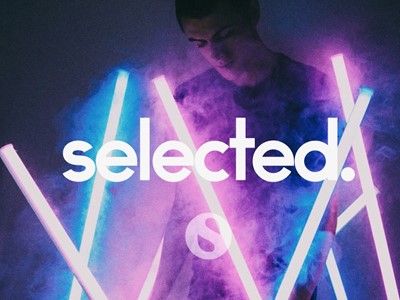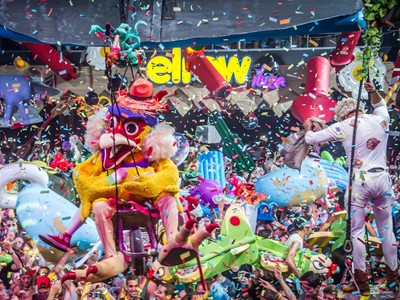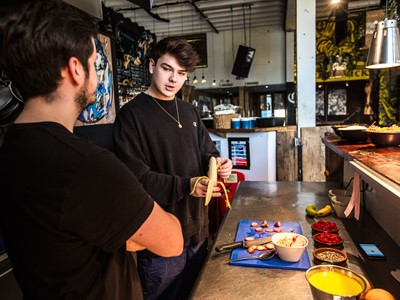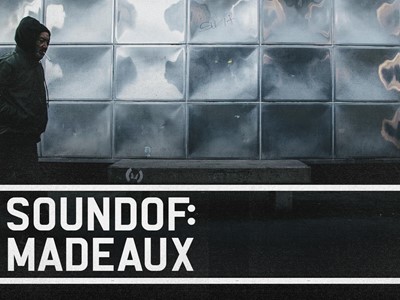Contributor
North Carolina-born Travis Stewart, or Machinedrum to me and you, occupies a unique place in the electronic music scene.
Since his first independent release in 1999 he has produced and composed over a dozen albums under various aliases, covering an astonishing variety of styles with ease. His work as Machinedrum however, remains a creative force to be reckoned with and it is under this moniker he continually offers his most forward thinking and imaginative works.
We spoke to the man of many monikers ahead of his set at this year's Field Day Festival.
For over 15 years you have displayed a particular dexterity in your electronic music creations. Your most recent release ‘Human Energy’ is distinctly lighter and more effervescent than your prior work. Why the change of direction?
Theres never any real conscious decision to change my sound. It changes over time. People don’t realise that between albums I’m writing a ton of music that no one will ever hear. Over the period of time between Vapor City and Human Energy I wrote around 2 or 3 albums worth of music. When it was time to consider releasing another album I started going over the tracks I had written.
For the most part the tracks all resembled the same sonic journey I had been on when writing Vapor City. While the tracks themselves were great, I decided they weren’t really worth putting out as I had already told that story. Meanwhile a lot of the production I had been working on for singers and songwriters was starting to take a different form, a more major chord and less sample based direction. I was having a lot of fun making these brighter sounding tracks and felt I was opening a door to something more refreshing.
The bulk of music out there these days, especially within the underground electronic world, is quite dark and brooding. We are living in quite dark times and making bright, cheerful music was my form of therapy. It was my way of looking toward a bright future rather than focusing on the current chaos of our world.
I also think its really easy to make dark music, In general its easier to tap in to the dark side of ourselves rather than push to be a positive and motivational voice. I wanted to make something that was powerful, in your face and uplifting at the same time.
You have created music under several different monikers with a varying musical style. Did you have a diverse musical upbringing or did you find inspiration elsewhere?
All forms of music have been incredibly influential from the earliest point in my musical journey to now. I find inspiration in beautiful, focused and well executed music. All genres have something to offer. I grew up surrounded by country, classical, jazz, folk and progressive rock that my parents and grandparents listened to. I stayed glued to the television watching MTV. I was in to it all, Yo MTV Raps, Headbangers Ball, 120 Minutes and eventually MTV’s AMP.
I was also part of several ensembles and bands when I was younger. African ensembles, marching band, jazz band, cover bands, percussion ensembles and even a steel drum ensemble at one point. No one listened to Electronic music where I grew up in North Carolina so I found it necessary to explore that world myself. That is where projects like Machinedrum and Syndrone were born.
Was your musical background beneficial in creating the vast styles of music you do?
Absolutely. Everything I’ve listened to, good and bad, have influenced everything that I do. I get bored doing the same thing over and over. It may be to my detriment as each album I release ends up pissing off people that were into the previous album. Life is too short to keep doing the same thing over and over.
How did you become introduced to electronic music and what fired up your imagination propelling you to start creating the music you do now?
My initial interest in Electronic music stemmed from my love for Industrial music. I remember seeing a video for Ministry on MTV and instantly fell in love with the sound. That lead me to discovering Skinny Puppy, Front Line Assembly, Nitzer Ebb, Pigface, Einstürzende Neubauten and tons of other industrial artists.
For a short period of time I just started buying more mainstream electronic music like Underworld, Chemical Brothers, The Orb and Roni Size. One day I decided to buy Aphex Twin’s Richard D James Album just because of the album cover. I had no idea what Aphex Twin sounded like or what to expect, but I kept seeing that cover in electronic sections at record shops and had to investigate. It ended up becoming the album I listened to the most for a few years. I was obsessed. It was from there that I went on to discover labels like Warp and Ninja Tune. The rest was history.
The absolute freedom of expression and discovery of new worlds of sound that weren’t explored before fascinated me. I had to figure out how the hell they were doing it. I started buying magazines like Future Music, Tape Op and others to figure out how to make electronic music. I think I even literally did a web search “how do you make electronic music” on webcrawler or whatever popular search engine there was in the 90s. I didn’t really have money to buy all the gear that most of the electronic music producers had at the time. So I found whatever free-ware I could find online and started from there. Initially my first productions were made in Rebirth and Impulse Tracker.
As I’ve mentioned you have many monikers but we know you best as Machinedrum. When did Machinedrum come about?
Machinedrum was created sometime in the late 90s. I was experimenting with jungle, breakcore and hiphop. I was obsessed with trying to explore the connections between hip hop and drum n bass. I forget which record it was, possibly Andy C or similar, but a friend had brought over some drum n bass records and we were listening to them. I remember dropping the needle halfway thru the beat and I was hearing the beat play in half time by accident, almost like a hip hop beat. When I started listening to the track from the beginning I realised my brain had moved where the 1 was by accident. I decided from there I wanted to make music that sounded like that. I was also astonished by the music of Boards of Canada. Their melodies and mysterious nature evoked emotions in me that were indescribable.
You’ve moved around a bit, where has been your favourite place to live so far?
My favourite place to live is wherever I’m at typically! I love every place I’ve lived as each place has been integral in my growth as a musician and producer. The nature of North Carolina, the DIY noise scene of Orlando, the hustle and bustle of New York City, the darkness and debauchery of Berlin and the laidback nature of Los Angeles have all made me the person I am today. While I love the city and the energy it contains I do feel a pull back to the nature I grew up around in North Carolina. I think that’s why Los Angeles is so right for me currently, a perfect balance of city life and beautiful nature.
Who are your main musical influences?
Steve Reich, J Dilla, Aphex Twin, Daft Punk, Boards of Canada, Smashing Pumpkins, Herbie Hancock and Tortoise.
You recently got engaged, congratulations! Do you think your fiancée has affected your musical style in recent times?
I’m actually now happily married as of October 2016! My wife comes from a very different music background but we definitely find a lot of common ground. She keeps me in touch with a lot of new rap music thats out as she’s a DJ as well. I wouldn’t necessarily say she has affected my music directly but I’m sure her presence has probably influenced me in some way, most likely emotionally.
Who has been your favourite artist to collaborate with?
They’re all great!
How do live shows compare to DJ sets?
My current A/V show is very involved and takes ages to set up and get working properly where-as a DJ set I just show up and plug a usb drive into a CDJ and start playing.
How do you find working as a solo artist versus working as a duo?
Working as a duo is great because you get to do things you wouldn’t normally do solo. You get to try out new ideas and get twice as much done than you would by yourself. I guess it’s easy to find yourself doing habitual things when working solo. When working with others you find yourself stepping outside of your comfort zone and trusting other people’s intuition instead of your own. That is where you find some really awesome ideas.
What acts at Field Day are you looking forward to hearing?
Aphex Twin, Arab Strap, Death Grips, Kaitlyn Aurelia Smith, Moodyman, PC Music and Slowdive.
What’s your opinion on inner city festivals, particularly in London?
I think it’s a great opportunity for people to be able to explore cities they’ve never been to. It can be quite chaotic, but festivals are chaotic in general.
Some people feel the electronic music scene is becoming saturated. How do you feel about the current scene for electronic music? Would you agree with this statement?
I personally think its great that so many people are making electronic music these days. It’s way better than in the past where I struggled to explain to people what it is that I do. I get booked way more in America now that it is the music of the youth. I think music in general is becoming oversaturated. Pop and rap music are both electronic in nature, in production terms, so theres definitely an abundance of electronic sounds everywhere you go.
What do you think the future holds for electronic music and for Machinedrum?
The future is now.
Catch Machinedrum playing at Field Day on Saturday 3rd June. Get tickets here.













